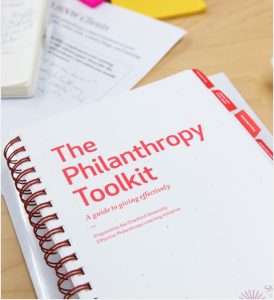
Who is this for?
This toolkit is designed for high-capacity donors interested in stepping into or continuing a role as effective philanthropists. Effective philanthropists go beyond writing checks to nonprofit organizations. They support the impact of effective organizations aligned with their philanthropic missions. It is personally meaningful as well as socially impactful.
Why use this toolkit?
Creating sustained social impact and maximizing the value of your philanthropic dollars takes careful planning and reflection. Without extensive experience in the social sector, the process can seem overwhelming at times. This toolkit guides you through each stage of your philanthropic planning. It provides you with resources and activities to ensure that your philanthropy can positively contribute to improving the world around you, while adding more meaning to your own life.
How can you use this toolkit?
We encourage you to make this toolkit work for your needs and financial situation. You can work through it in order, or jump to the specific modules that apply to the current stage of your philanthropy. Spend as much time as you need to achieve the objectives in each module—you do not need to come up with all the answers in a single sitting, or even in a single year.
You can easily adapt this toolkit’s activities and worksheets for a couple or a family. For example:
- for worksheets, each participant can receive a copy and complete these worksheets separately before coming together to discuss their responses and determine a collective decision.
- for activities involving cards, you can print multiple copies of the cards, and each participant can go through the exercise individually and then share their responses, or you can work through the activities together.
Working through this toolkit with the guidance of a financial advisor can help you integrate your philanthropic planning into your broader wealth management strategy. Your advisor’s expertise on financial structures, as well as knowledge of your personal finances and goals, may also be helpful at various points in the toolkit.
Our goal is to help you transform your philanthropic vision into action without getting stuck in the planning stage of the process. Many successful philanthropists find it helpful to organize their philanthropy into different cycles—they create a three-year or five-year giving plan, use that time to test their plan and learn in the field, then revisit and adapt the plan before continuing the process. We encourage you to create a timeline for yourself before beginning the toolkit.
We believe that there is no single correct way to be a philanthropist. What matters is that you make informed, thoughtful decisions and continue learning along the way.
If you are having any issues, or need to inquire directly with our team, contact us.
Toolkit Primer
The Primer helps you navigate the toolkit in response to specific, philanthropy-related questions. If you are unsure where to start, use the Primer before diving into the Toolkit’s main material.
Toolkit Primer
Get involved
This is an evolving resource which we are excited to share with you. We would love to hear your comments and suggestions for future versions.
Get involved